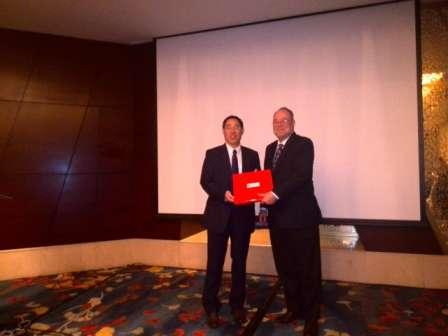

UCAS signed a Memorandum of Understanding (MOU) with the University of Tasmania and with the government of the state of Tasmania, Australia, at the Shangri-La China World Summit Wing on 10 September, 2015. Both MOU were signed by Prof. Wu Yueliang, Vice-President of UCAS, Prof. Mike Calford, Deputy Vice-Chancellor International of the University of Tasmania and Mr. Matthew Groom, Tasmania’s Minister for Environment, Parks and Heritage.
According to the MOU between UCAS and the government of Tasmania, the latter will sponsor research by UCAS faculty and graduate students concerning Devil Facial Tumor Disease (DFTD) afflicting the Tasmanian devil. The Tasmanian devil, Sarcophilus harrisii, is the world’s largest remaining carnivorous marsupial (since the presumed extinction of the thylacine or Tasmanian tiger). It is found in the wild only in Tasmania where it is widespread. Although once common, it is now regarded as a threatened species because of DFTD.
According to the MOU between UCAS and the University of Tasmania, both sides will cooperate in marine research, geosciences, agricultural research and health and medical research by a joint graduate student training program and exchange programs of faculty and graduate students.
Tasmania is Australia’s southeastern island-state with a unique culture and atmosphere. It is one of the world's most mountainous islands. With fewer introduced predators and a relatively large amount of intact habitat, Tasmania is a final refuge for many animal species including the Tasmanian devil. The diversity of Tasmania's vegetation is also remarkable and includes some of the most ancient plant species on Earth, the tallest flowering trees, the oldest plant clones and a high proportion of endemic species.
The University of Tasmania is the fourth oldest university in Australia and is ranked in the top 10 Australian research universities and the top 3 per cent of universities globally. It is globally famous for such fields as life science, environmental sciences, marine, and geology.

